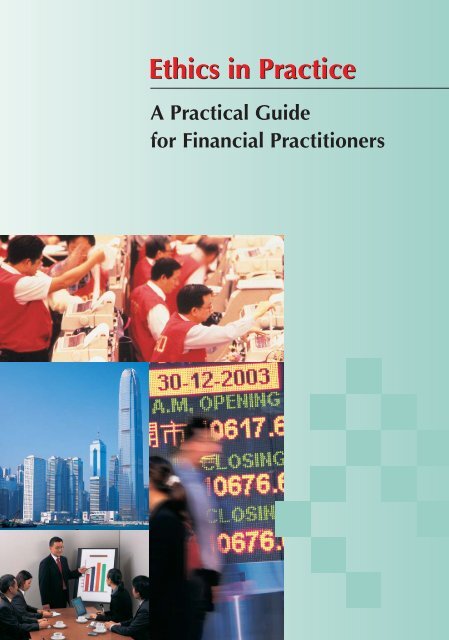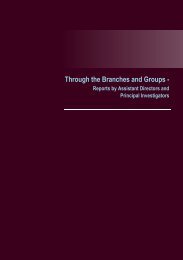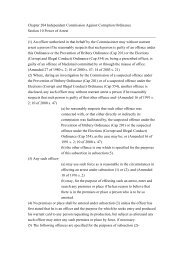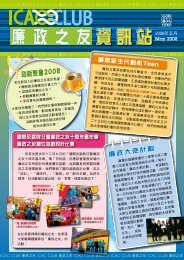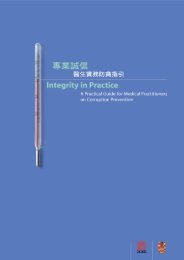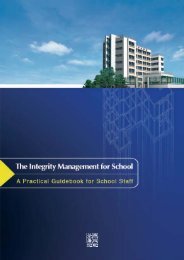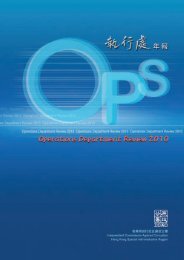Ethics in Practice - A Practical Guide for Financial Practitioners
Ethics in Practice - A Practical Guide for Financial Practitioners
Ethics in Practice - A Practical Guide for Financial Practitioners
Create successful ePaper yourself
Turn your PDF publications into a flip-book with our unique Google optimized e-Paper software.
<strong>Ethics</strong> <strong>in</strong> <strong>Practice</strong><br />
A <strong>Practical</strong> <strong>Guide</strong><br />
<strong>for</strong> F<strong>in</strong>ancial <strong>Practitioners</strong>
This book is jo<strong>in</strong>tly published by the organizers of Professional<br />
<strong>Ethics</strong> Programme <strong>for</strong> the Securities, Futures and Investments Sectors<br />
<br />
Hong Kong Association of F<strong>in</strong>ancial Advisors<br />
<br />
Hong Kong Exchanges and Clear<strong>in</strong>g Limited<br />
<br />
Hong Kong Investment Funds Association<br />
<br />
Hong Kong Securities Institute<br />
<br />
Hong Kong Securities Professionals Association<br />
<br />
Hong Kong Stockbrokers Association Limited<br />
<br />
Independent Commission Aga<strong>in</strong>st Corruption, HKSAR<br />
<br />
Securities and Futures Commission<br />
October 1999 English Version - First Edition<br />
March 2000 English Version - Second Edition<br />
March 2004 English Version - Revised Edition
CONTENTS<br />
Message from F<strong>in</strong>ancial Secretary, HKSAR<br />
Message from Commissioner,<br />
Independent Commission Aga<strong>in</strong>st Corruption, HKSAR<br />
Message from Chairman, Organiz<strong>in</strong>g Committee of Professional<br />
<strong>Ethics</strong> Programme <strong>for</strong> the Securities, Futures and Investments Sectors<br />
Organiz<strong>in</strong>g Committee<br />
Acknowledgements<br />
Def<strong>in</strong>itions<br />
iii<br />
iv<br />
v<br />
vi<br />
vii<br />
viii<br />
PART 1<br />
ETHICS IN PRACTICE - NOT OPTIONAL<br />
1.1 Introduction 4<br />
1.2 What is bus<strong>in</strong>ess ethics? 4<br />
1.3 Why is bus<strong>in</strong>ess ethics important to f<strong>in</strong>ancial practitioners? 5<br />
1.4 Why is bus<strong>in</strong>ess ethics important to f<strong>in</strong>ancial markets? 6<br />
PART 2 LEGAL AND ETHICAL ISSUES FACED BY<br />
FINANCIAL PRACTITIONERS<br />
2.1 Introduction 12<br />
2.2 Standards of behaviour 12<br />
2.3 <strong>Guide</strong>l<strong>in</strong>es to handle legal and ethical issues 14<br />
2.4 Bribery, illegal gifts and commission 15<br />
2.5 Use of confidential <strong>in</strong><strong>for</strong>mation 23<br />
2.6 Conflicts of <strong>in</strong>terest 30<br />
2.7 Professional competence 35<br />
PART 3<br />
ETHICAL DECISION MAKING<br />
3.1 Introduction 44<br />
3.2 ETHICS PLUS decision mak<strong>in</strong>g model 44<br />
3.3 How to apply the ETHICS PLUS decision mak<strong>in</strong>g model 46
PART 4<br />
ETHICS IN MANAGEMENT - THE COMPLETE SOLUTION<br />
4.1 Introduction 54<br />
4.2 How to build up an ethical culture 54<br />
4.3 Formulat<strong>in</strong>g a corporate code of conduct 56<br />
4.4 Strengthen<strong>in</strong>g a system of controls 57<br />
4.5 Organiz<strong>in</strong>g tra<strong>in</strong><strong>in</strong>g <strong>for</strong> staff 61<br />
4.6 Whistle blow<strong>in</strong>g 62<br />
PART 5<br />
SERVICES AND ASSISTANCE<br />
5.1 Introduction 66<br />
5.2 Independent Commission Aga<strong>in</strong>st Corruption 66<br />
5.3 Regulatory authorities 70<br />
5.4 Professional <strong>in</strong>stitutions 71<br />
APPENDICES AND REFERENCES<br />
Appendix I : Extracts of Securities and Futures Ord<strong>in</strong>ance<br />
(Sections 114 and 115) 74<br />
Appendix II : Extracts of the Prevention of Bribery Ord<strong>in</strong>ance 78<br />
Appendix III : Extracts of Securities and Futures Ord<strong>in</strong>ance<br />
(Sections 270 and 291) 81<br />
Appendix IV : Sample Code of Conduct 86<br />
References 99
1.1 Introduction<br />
Hong Kong, be<strong>in</strong>g an <strong>in</strong>ternational f<strong>in</strong>ancial centre, has well developed<br />
f<strong>in</strong>ancial markets. Fund management and corporate f<strong>in</strong>ance bus<strong>in</strong>esses have<br />
also grown <strong>in</strong>creas<strong>in</strong>gly sophisticated with a strong presence of <strong>in</strong>ternational<br />
f<strong>in</strong>ancial <strong>in</strong>stitutions. To ma<strong>in</strong>ta<strong>in</strong> Hong Kong’s lead<strong>in</strong>g position as an<br />
<strong>in</strong>ternational f<strong>in</strong>ancial centre <strong>in</strong> the Asia Pacific region, through uphold<strong>in</strong>g high<br />
ethical standards, is <strong>in</strong> the <strong>in</strong>terests of every f<strong>in</strong>ancial practitioner and <strong>in</strong>vestor.<br />
In short, ethics <strong>in</strong> f<strong>in</strong>ancial practice is not an optional issue. It is a necessity.<br />
1.2 What is bus<strong>in</strong>ess ethics?<br />
1.2.1 Ways of conduct<strong>in</strong>g bus<strong>in</strong>ess<br />
Bus<strong>in</strong>ess ethics covers the whole spectrum of <strong>in</strong>teractions between<br />
<strong>in</strong>dividuals, companies, <strong>in</strong>dustries and the society. It is about how we conduct<br />
our bus<strong>in</strong>ess affairs fairly and legally, irrespective of an <strong>in</strong>dividual’s or a<br />
company’s stand<strong>in</strong>g and size of operation <strong>in</strong> the market.<br />
1.2.2 Above legal requirements<br />
People often tend to def<strong>in</strong>e bus<strong>in</strong>ess ethics as<br />
mean<strong>in</strong>g merely operat<strong>in</strong>g with<strong>in</strong> the law.<br />
However, it means far more than that. <strong>Ethics</strong>, <strong>in</strong><br />
bus<strong>in</strong>ess, is a set of standards above the legal<br />
m<strong>in</strong>imal requirements, that clearly def<strong>in</strong>es the<br />
approach to handl<strong>in</strong>g ethical issues <strong>in</strong> this<br />
mercurial bus<strong>in</strong>ess environment where there are<br />
few fixed rules, but many "grey" areas.<br />
4
1.3 Why is bus<strong>in</strong>ess ethics important to<br />
f<strong>in</strong>ancial practitioners?<br />
1.3.1 Basic registration requirement<br />
In most f<strong>in</strong>ancial markets throughout the world, practitioners provid<strong>in</strong>g<br />
securities, futures and <strong>for</strong>eign exchange services are required to be authorized<br />
by a regulated authority. In Hong Kong, practitioners are required to be<br />
licensed by or registered with the Securities and Futures Commission (SFC)<br />
be<strong>for</strong>e conduct<strong>in</strong>g bus<strong>in</strong>ess. It is an offence to conduct such f<strong>in</strong>ancial services<br />
bus<strong>in</strong>ess without the appropriate licence or registration.<br />
In order to obta<strong>in</strong> or ma<strong>in</strong>ta<strong>in</strong> such a licence or registration with the<br />
SFC, a person must satisfy and cont<strong>in</strong>ue to satisfy the SFC that he is a "fit and<br />
proper person". That is to say, the onus is on the applicant to prove himself<br />
that he meets the necessary requirements <strong>for</strong> licens<strong>in</strong>g or registration, whether<br />
he is an <strong>in</strong>dividual or a company.<br />
The detailed guidel<strong>in</strong>es are set out <strong>in</strong> the "Fit and Proper <strong>Guide</strong>l<strong>in</strong>es"<br />
issued by the SFC. It places emphasis on the high standards of conduct <strong>for</strong><br />
applicants apart from their educational, experiential and professional<br />
qualifications. They must conduct their bus<strong>in</strong>ess with <strong>in</strong>tegrity, fairness and<br />
diligence, and organize their <strong>in</strong>ternal affairs <strong>in</strong> a responsible manner. The SFC<br />
will <strong>in</strong>evitably impugn the fitness and propriety of those f<strong>in</strong>ancial practitioners<br />
whose behaviour is unethical.<br />
1.3.2 Prevention of non-compliance<br />
The pr<strong>in</strong>ciples of bus<strong>in</strong>ess ethics underp<strong>in</strong> the "fit and proper"<br />
guidel<strong>in</strong>es and related regulations <strong>in</strong> the f<strong>in</strong>ancial <strong>in</strong>dustry. When such self<br />
discipl<strong>in</strong>e of practis<strong>in</strong>g above the legal m<strong>in</strong>imal requirements becomes a state<br />
of m<strong>in</strong>d, f<strong>in</strong>ancial practitioners are guarded aga<strong>in</strong>st regulatory sanctions and<br />
thus avoid the costs of non-compliance such as reprimand, suspension or<br />
revocation of licence, or be<strong>in</strong>g restricted and <strong>in</strong>tervened.<br />
5
Prevention is always better than cure. Spend<strong>in</strong>g ef<strong>for</strong>t up front <strong>in</strong><br />
adher<strong>in</strong>g to the ethical standards expected by the regulatory authorities is far<br />
better than rebuild<strong>in</strong>g the hard-earned reputation of a f<strong>in</strong>ancial <strong>in</strong>termediary<br />
that has been impaired by unethical practice. As such, adopt<strong>in</strong>g a high<br />
standard of bus<strong>in</strong>ess conduct is not an esoteric concept. It is a realistic one<br />
which ensures the future success of f<strong>in</strong>ancial practitioners.<br />
1.3.3 Effective market<strong>in</strong>g tool<br />
A number of survey studies revealed that an average of 70% of<br />
consumers, <strong>in</strong>clud<strong>in</strong>g <strong>in</strong>vestors, considered the ethical conduct of an<br />
<strong>in</strong>dividual or a company a major bear<strong>in</strong>g on their decision <strong>in</strong> select<strong>in</strong>g its<br />
products or services (1). The market<strong>in</strong>g equation is thus simple: Investors will<br />
seek bus<strong>in</strong>ess relationships with organizations that they can trust. The<br />
implementation of bus<strong>in</strong>ess ethics with<strong>in</strong> a company creates an environment of<br />
confidence, familiarity and predictability which is crucial to customer loyalty<br />
and long-term bus<strong>in</strong>ess relationships with clients. In other words, bus<strong>in</strong>ess<br />
ethics and revenues are <strong>in</strong>extricably bound regardless of differences <strong>in</strong> the<br />
structure and size of companies.<br />
1.4 Why is bus<strong>in</strong>ess ethics important to<br />
f<strong>in</strong>ancial markets?<br />
1.4.1 Enhancement of competitiveness<br />
In the face of severe competition, especially <strong>in</strong> the Asia Pacific region,<br />
profit mak<strong>in</strong>g or improvement of service quality is not the only element to<br />
ma<strong>in</strong>ta<strong>in</strong><strong>in</strong>g the competitiveness of Hong Kong. Both local and overseas<br />
<strong>in</strong>vestors are less tolerant of unethical practices nowadays. In the course of<br />
(1) The percentage is quoted from "Hunt<strong>in</strong>g - Who cares about socially responsible bus<strong>in</strong>ess<br />
practices? Seventy percent of consumers, that’s who." written by Gayle Sato Stodder, 1998.<br />
6
us<strong>in</strong>ess deal<strong>in</strong>g, they are seek<strong>in</strong>g assurances about market <strong>in</strong>tegrity and<br />
fairness, a level play<strong>in</strong>g field <strong>in</strong> competition and transparency. To this end, the<br />
commitment of all f<strong>in</strong>ancial practitioners to observ<strong>in</strong>g the laws and practis<strong>in</strong>g<br />
bus<strong>in</strong>ess ethics is the key to build<strong>in</strong>g up the trust and confidence of <strong>in</strong>vestors<br />
and enhanc<strong>in</strong>g the competitive edge of the f<strong>in</strong>ancial markets <strong>in</strong> Hong Kong.<br />
1.4.2 Requirement of <strong>in</strong>ternational standards<br />
These days, people around the world are more aware of the notion of<br />
right and wrong. Sound bus<strong>in</strong>ess practice has reached new heights <strong>in</strong> market<br />
compliance and ethical literacy. The f<strong>in</strong>ancial markets <strong>in</strong> Hong Kong have to<br />
move with the times and are <strong>in</strong> tandem with the <strong>in</strong>ternational requirements of<br />
plac<strong>in</strong>g heavy emphasis on the market’s transparency, accountability and the<br />
bus<strong>in</strong>ess conduct of f<strong>in</strong>ancial practitioners themselves.<br />
1.4.3 Ultimate benefit of the profession<br />
Few will risk their <strong>in</strong>vestments <strong>in</strong> an unethical and corrupt market. The<br />
prospect of the profession <strong>in</strong> the f<strong>in</strong>ancial <strong>in</strong>dustry h<strong>in</strong>ges on an environment<br />
regulated by ethics and professional discipl<strong>in</strong>e. When bus<strong>in</strong>ess ethics is<br />
adequately en<strong>for</strong>ced <strong>in</strong> the f<strong>in</strong>ancial markets, it ultimately benefits all<br />
practitioners. The reverse is equally true if bus<strong>in</strong>ess ethics is neglected.<br />
Unethical practitioners may f<strong>in</strong>d themselves <strong>in</strong> trouble when public op<strong>in</strong>ion<br />
turns aga<strong>in</strong>st them and the bus<strong>in</strong>ess opportunities are lost to competitors.<br />
1.4.4 Essential <strong>in</strong>gredient of professionalism<br />
The cont<strong>in</strong>uance of public confidence <strong>in</strong> the f<strong>in</strong>ancial markets largely<br />
depends on the professional ethics of practitioners <strong>in</strong> protect<strong>in</strong>g the <strong>in</strong>terests of<br />
clients and stakeholders <strong>in</strong>clud<strong>in</strong>g employers, employees and the <strong>in</strong>dustry<br />
itself. Furthermore, the fulfilment of professional standards through ethical<br />
bus<strong>in</strong>ess practice is a social responsibility which should be borne by all<br />
f<strong>in</strong>ancial practitioners.<br />
7
2.4.4 Application of the conduct requirement<br />
Scenario 1 Offer<strong>in</strong>g and accept<strong>in</strong>g an advantage both constitut<strong>in</strong>g an offence<br />
Peter is a deal<strong>in</strong>g director of a brokerage company. Due to the<br />
favourable per<strong>for</strong>mance <strong>in</strong> the local property market, the Hang Seng Index is<br />
driven up and many of his clients place orders to buy blue-chip stocks. In<br />
order to deal with the clients’ orders expeditiously, Peter decides to direct a<br />
portion of the bus<strong>in</strong>ess to an external broker.<br />
Without tak<strong>in</strong>g the service quality <strong>in</strong>to consideration, Peter offers the<br />
bus<strong>in</strong>ess to his golf<strong>in</strong>g partner, David. In fact, David charges a much higher<br />
brokerage rate than other brokers. One day, <strong>in</strong> a prestigious country club,<br />
David thanks Peter <strong>for</strong> giv<strong>in</strong>g him the bus<strong>in</strong>ess. He tells Peter that he is now on<br />
the executive committee of the country club and is able to secure <strong>for</strong> Peter one<br />
of the highly sought after memberships. David even implies that if Peter<br />
cont<strong>in</strong>ues to provide him with bus<strong>in</strong>ess <strong>in</strong> the future, Peter will have more<br />
advantages. In response, Peter accepts the offer gratefully.<br />
Analysis: Peter violates the Codes of Conduct by abus<strong>in</strong>g his official<br />
position to refer bus<strong>in</strong>ess to David <strong>in</strong> return <strong>for</strong> accept<strong>in</strong>g an advantage<br />
<strong>in</strong> the <strong>for</strong>m of a country club membership. Peter fails to fulfil his<br />
obligation to protect the <strong>in</strong>terests of his employer and clients as David<br />
may not be the broker who provides the best service to his company,<br />
not to mention the excessive brokerage fee charged.<br />
If Peter does not obta<strong>in</strong> prior permission from his employer<br />
to accept the advantage, both Peter and David are <strong>in</strong> breach of Section<br />
9 of the PBO. That is, Peter commits an offence of accept<strong>in</strong>g a bribe<br />
and David commits an offence of offer<strong>in</strong>g a bribe. Even if Peter refers<br />
the bus<strong>in</strong>ess to David because the latter can offer the same quality of<br />
service at the same brokerage fee as other brokers, they still violate the<br />
PBO. In court, Peter cannot excuse himself by say<strong>in</strong>g that his employer<br />
did not suffer any loss as a result of his act. Whether his act has caused<br />
damage to the employer is only one of the factors to be considered <strong>in</strong><br />
mitigation by the judge.<br />
18


